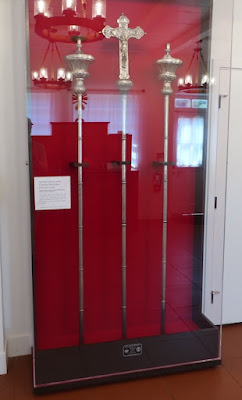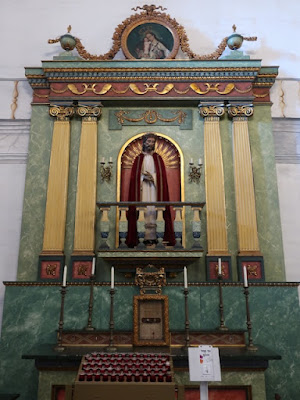Mission San Jose is surprisingly not in San Jose, California. It's actually in Fremont, just north and east of the town named after him. A modern Saint Joseph's church has been built a few hundred feet away that serves as the parish for local Catholics.
The mission was founded on June 11, 1797, by Padre Fermin Francisco de Lasuen. It was the fourteenth of the twenty-one missions on the Camino. The 1809 church was destroyed by an earthquake in 1868. A Gothic-style church was built. In 1982, it was decided to rebuild the mission church based on records and drawings from the early nineteenth century, following the construction methods from 1809 and incorporating the decorations from the 1833-1840 refurbishment of the interior.
 |
| Mission San Jose |
The
Camino Real (the road joining all the mission churches) had bells along the route between the missions to guide travelers. Those bells are recreated along Route 101 and a sample is on display just outside the mission church.
 |
| Example of the Camino bells |
Most of the old mission has been turned into a pilgrim center and museum, showcasing period items and lifestyles. The first room talks about Saint Joseph, the patron of the mission, including some Nativity scenes.
 |
| A classical Nativity |
 |
| A native interpretation of the Nativity |
 |
| Saint Patrick |
A typical Franciscan bedroom is on display, showing the simple lifestyle of the missionaries.
 |
| Bedroom |
The next room has information about the
Ohlone, the local tribe when the Franciscans arrived.
 |
| Ohlone village |
 |
| Tool used by the locals |
 |
| A carpenter's bench, since it's Saint Joseph's spot |
At the end of the mission building is the Saint Joseph Chapel of Healing, a recent addition that features vestments and liturgical objects from the history of the mission.
 |
| Chapel of Healing nave |
 |
| Altar with relics |
 |
| Various processional items |
 |
| Historic vestments |
Back in the 1800s, parishioners could "subscribe" to a pew in the church. They would donate money and have a reserved seat. A display of pew labels tells the story.
 |
| Not necessarily reservation in Heaven |
 |
| A vintage organ |
The new church (where we went to Sunday Mass but didn't take pictures) has a recently-installed mural called
The Wedding Feast of the Lamb: God's Dream for Humanity which features Jesus in the center flanked by saints from all over the world and all through time. It is quite impressive. A copy is in the museum.
 |
| Left side of the mural |
 |
| Right side of the mural |
The mission church is impressive in size and has a few items that survived from the original church.
 |
| Nave |
 |
| Choir loft |
The
Ecce Homo side altar has a statue from the original adobe church. It shows Christ as Pilate presented Him to the crowds after He had been scourged.
 |
| Ecce Homo altar |
 |
| An elaborately-decorated side entrance |
 |
| Our Lady's altar |
The main altar includes a fifteenth-century statue of Saint Joseph and a painting of Jesus commissioned by
Junipero Serra.
 |
| Main altar |
 |
| Jesus |
 |
| Bells used during Mass! |
A door leads out the the mission cemetery.
 |
| Skull and crossbones exit sign? |
 |
| Cemetery |
 |
| A historic marker |
 |
| A dry fountain |
The main room of the visitor center includes a timeline of the missions' history.
 |
| Timeline |
The regular church features a lot of interesting outdoor items. A long path has very large
Stations of the Cross. A grotto has a statue of Saint Joseph the Worker.
 |
| Outdoor stations of the cross |
 |
| Saint Joseph the Worker |
The most interesting spot is the Dream Garden, with a large statue of Sleeping Saint Joseph. The work is inspired by how Saint Joseph was visited by angels in his dreams, telling him it was okay to marry Mary and instructing him to travel at a moment's notice.
 |
| Dreaming saint and what the dreams made him do |
 |
| The other side of the statue |
 |
| A spot to leave prayer requests |
 |
| Warning |
This was the first of many missions that we visited on our trip.







































We went there on a field trip in 6th grade. Just a few years ago lol
ReplyDelete